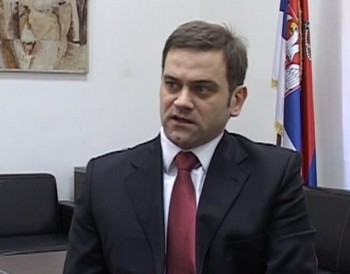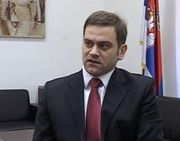Q:
A:
Next stage of dialogue with Pristina to continue resolving vital issues
Belgrade,
7 March 2012
Head of the Serbian team for talks with Pristina Borislav Stefanovic stated that the first stage of dialogue between Belgrade and Pristina was concluded by reaching consensus over seven agreements on important areas of citizens’ lives, while the next stage will deal with very complex issues, such as electricity and telecommunications.
In an interview to Tanjug news agency, prior to the first anniversary since the talks began, Stefanovic said that after the formation of a new Serbian government, the next stage of talks will be opened, on which the date for commencing Serbia’s accession talks with the EU will depend.
He voiced his pleasure with results achieved in the talks so far, stressing that over the past year the Serbian negotiating team showed that disputed issues in Kosovo-Metohija can be resolved though agreement and with the respect of national interests, the Serbian Constitution and its laws.
Stefanovic said that after the elections, the new government will decide which direction it will take and in what form it will conduct dialogue, stressing that the most complex stage is yet ahead.
I expect that the talks will continue about the issue of telecommunications and electricity, as well as about other important issues such as the return of IDPs to the province, restitution of seized property and resolving the issue of missing persons, Stefanovic said, adding that these topics are part of President Boris Tadic’s four-item plan.
Stefanovic underlined that these four items regulate the relations with Pristina without jeopardizing the national interest, the Serbian Constitution and UN Security Council Resolution 1244. As for the issue of the freedom of movement of international missions in the north of Kosovo, he stressed that a lot has already been achieved in this respect, adding that he expects EULEX and KFOR to have full freedom of movement on the entire territory of the province.
The head of the Serbian team voiced his belief that it is possible to resolve the issues of telecommunications and electricity although the two sides differ the most in this respect, he recalled.
He explained that Belgrade is trying to secure and regulate the survival of the Electric Power Industry of Serbia (EPS) and Telekom Srbija in the province, as well as to come into possession of these companies’ assets and enable their functioning south of the Ibar River, while Pristina is trying to remove every presence of any Serbian public company from the province.
Currently, there are over 4,000 EPS employees who were fired after 1999 and all of EPS’s energy and production capacities south to the Ibar River were usurped by the so-called Kosovo Energy Corporation (KEK).
Stefanovic said that the talks will aim to find a solution that will enable Serbs south of the Ibar River to regain access to Telekom’s network, which was disabled after Telekom’s stations were destroyed, as well as to solve the issue of landlines which are now completely administered by Kosovo’s PTK.
There is also the issue of investments into these two companies by other Serbian companies, he recalled, announcing that when the time comes, the Serbian companies will file charges to prove their ownership and investments. However, in the meantime a solution must be found to resolve citizens’ daily problems in this remit.
Stefanovic explained that once Serbia resolves these issues, the road to getting the date for accession talks will be opened, which is important not only for the future of our citizens and the economy, but also because new manoeuvring space will thus be opened helping Serbia to more successfully defend its interests in the province.
He voiced his pleasure with results achieved in the talks so far, stressing that over the past year the Serbian negotiating team showed that disputed issues in Kosovo-Metohija can be resolved though agreement and with the respect of national interests, the Serbian Constitution and its laws.
Stefanovic said that after the elections, the new government will decide which direction it will take and in what form it will conduct dialogue, stressing that the most complex stage is yet ahead.
I expect that the talks will continue about the issue of telecommunications and electricity, as well as about other important issues such as the return of IDPs to the province, restitution of seized property and resolving the issue of missing persons, Stefanovic said, adding that these topics are part of President Boris Tadic’s four-item plan.
Stefanovic underlined that these four items regulate the relations with Pristina without jeopardizing the national interest, the Serbian Constitution and UN Security Council Resolution 1244. As for the issue of the freedom of movement of international missions in the north of Kosovo, he stressed that a lot has already been achieved in this respect, adding that he expects EULEX and KFOR to have full freedom of movement on the entire territory of the province.
The head of the Serbian team voiced his belief that it is possible to resolve the issues of telecommunications and electricity although the two sides differ the most in this respect, he recalled.
He explained that Belgrade is trying to secure and regulate the survival of the Electric Power Industry of Serbia (EPS) and Telekom Srbija in the province, as well as to come into possession of these companies’ assets and enable their functioning south of the Ibar River, while Pristina is trying to remove every presence of any Serbian public company from the province.
Currently, there are over 4,000 EPS employees who were fired after 1999 and all of EPS’s energy and production capacities south to the Ibar River were usurped by the so-called Kosovo Energy Corporation (KEK).
Stefanovic said that the talks will aim to find a solution that will enable Serbs south of the Ibar River to regain access to Telekom’s network, which was disabled after Telekom’s stations were destroyed, as well as to solve the issue of landlines which are now completely administered by Kosovo’s PTK.
There is also the issue of investments into these two companies by other Serbian companies, he recalled, announcing that when the time comes, the Serbian companies will file charges to prove their ownership and investments. However, in the meantime a solution must be found to resolve citizens’ daily problems in this remit.
Stefanovic explained that once Serbia resolves these issues, the road to getting the date for accession talks will be opened, which is important not only for the future of our citizens and the economy, but also because new manoeuvring space will thus be opened helping Serbia to more successfully defend its interests in the province.











